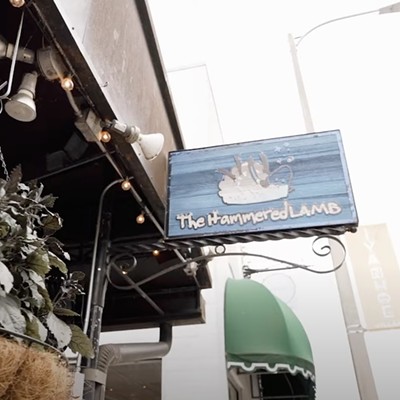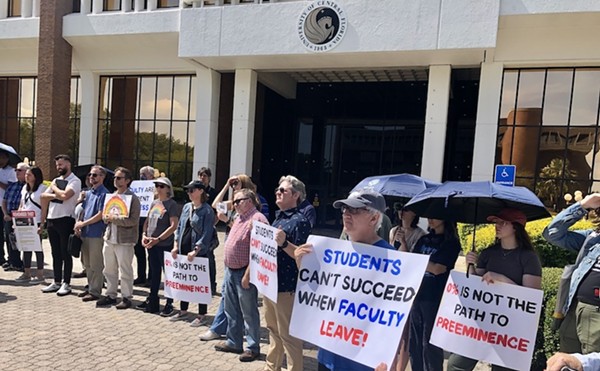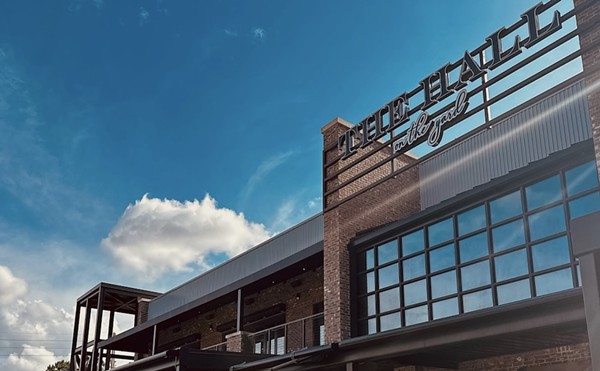Editor's note: This story was first published on April 14, 2008
On March 19, Orlando city attorney Mayanne Downs sent a letter to the Florida Commission on Human Relations that marked a dramatic reversal in city policy: The city policy that since December 1998 had forbidden new social service organizations from locating in Parramore and existing ones from expanding violated state law and "ought to be revoked or amended."
What's more, "city staff shall not enforce this policy and shall issue permits to emergency shelters, treatment and recovery facilities, residential social service facilities and uses within Parramore," Downs wrote. The letter promised that potential changes to the law would come before the city council on April 7 for approval.
That didn't happen.
Instead, the city simply changed its mind. The same ordinance that the city's top lawyer decided was illegal a month ago is today in full force. "We originally thought we needed to amend or revoke `the ban`," Downs tells Orlando Weekly. "Now we think what we have to do is be clearer."
But by Downs' own admission, the ramifications of city policy are anything but clear. "All I can tell you is it is a little unclear to me what the boundaries are," she says.
The problem started last month, when the Florida Civil Rights Association, representing two nonprofits that wanted to locate in Parramore but supposedly couldn't because of city law, complained to the FCHR that the city was violating the Florida Fair Housing Act (see Happytown™, March 20).
According to J Willie David III, the head of the civil rights group, the FCHR was going to rule against the city, and in favor of Mark's Ark and Concerned Citizens to Combat Cancer, the two nonprofits that wanted to locate group homes inside Parramore. On April 9, he sent Orlando Weekly an e-mail declaring victory, adding that the FCHR planned to announce findings this week that the city ban violated state law.
"This is something that is historic, especially for the people of downtown Orlando," David says.
The FCHR did not return calls seeking confirmation by press time, but such a finding appears unlikely for the very same reason the city used to justify its reversal: Those two groups filed the complaints after the city's planning department told them their proposed group homes would not adhere to the city's land-use laws in Parramore. However, they never formally filed applications for their projects, so technically the city never denied their permits, Downs says. That being the case, no laws were broken. Had they applied, and been turned down, it would be a different story.
That fact gave the city a chance to reevaluate. Rather than throwing out the whole ban, the city simply decided that it would not violate the federal and state Fair Housing Acts that ban discrimination against "protected classes." Among those protected classes are the disabled, including people with drug addictions.
Since both group homes in question would treat the disabled, Downs says that if they actually applied, the city would probably have no choice but to approve their applications, so long as they met other city criteria. "We will not violate federal or state laws," she says.
The question, though, is the degree to which such a decision opens the floodgates for other social service providers. The Coalition for the Homeless of Central Florida, for instance, provides treatment to some drug addicts in the heart of Parramore. Would it be allowed to expand under the city's new interpretation of the law? What about the Christian Service Center, a religious organization that feeds the homeless in Parramore? Since religious groups are also protected classes, could they too expand?
Maybe. Maybe not. No one, not even the city attorney, is certain. The homeless are not in and of themselves a protected class under the law, but there seem to be work-arounds if the nonprofits are so inclined. (Muffet Robinson, the Coalition's spokeswoman, declined to comment.)
"I don't quite know what the status is," says commissioner Robert Stuart, who also heads the Christian Service Center. Stuart was unaware of the March 19 letter until contacted by this reporter. After inquiring around City Hall, Stuart says he found disagreement among city staffers. "As far as I can tell, it's up in the air."
Downs says that if a social service provider wants to expand or locate inside Parramore, the city will look at their applications on a case-by-case basis. If one of those groups doesn't like the outcome, it could challenge the validity of the city's ban, and that challenge may help clear things up.
Unfortunately, as Stuart notes, most nonprofits don't have the resources to wage such a battle. "I've always thought this `policy` was questionable," he says. "We've never had anyone with the ability to stand up and fight it."
The ban was enacted years before Buddy Dyer took office, but he's enforced it with equal vigor. The city's point is understandable: An influx of more social services, and the clientele they bring, might further hinder the city's already fledgling revitalization efforts. But that position is untenable. The existing providers can't expand or renovate their services to meet the increasingly crushing demand. They've complained, but the city hasn't listened. They've threatened lawsuits, but the city's ignored them.
The stalemate continues. If you're an optimist, here's the bright side: Maybe this most recent to-do will at least re-spark the conversation. More likely, the status quo will prevail.

















